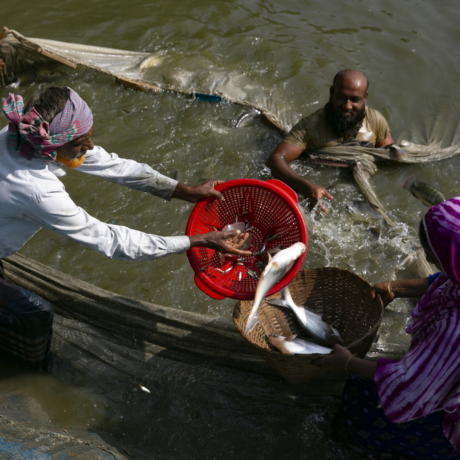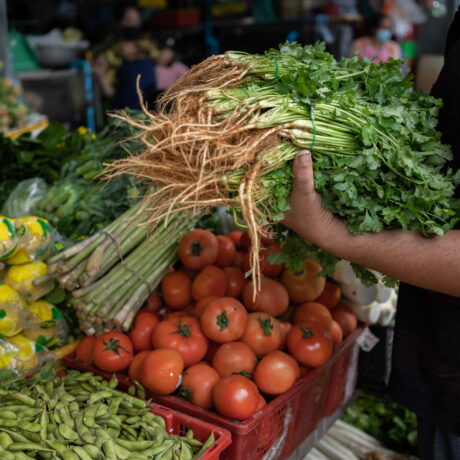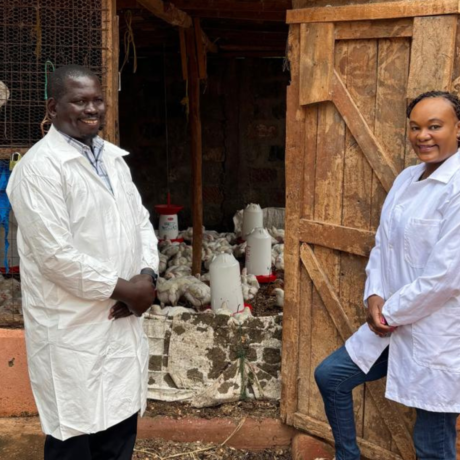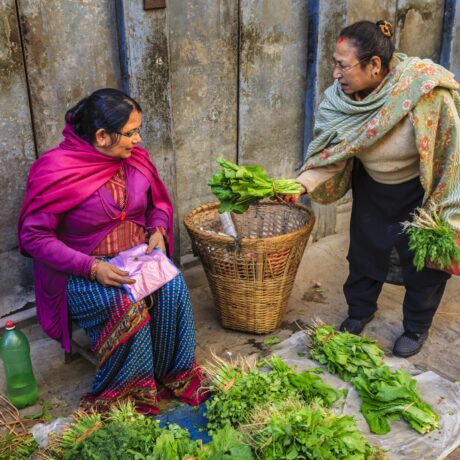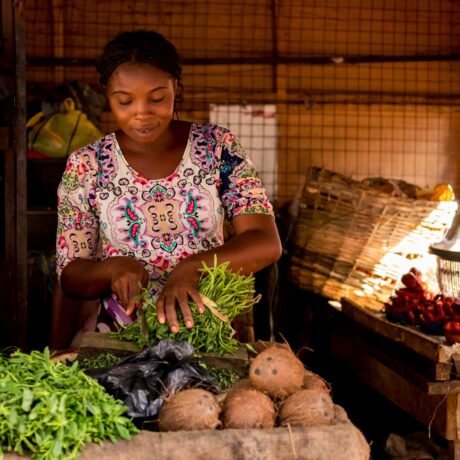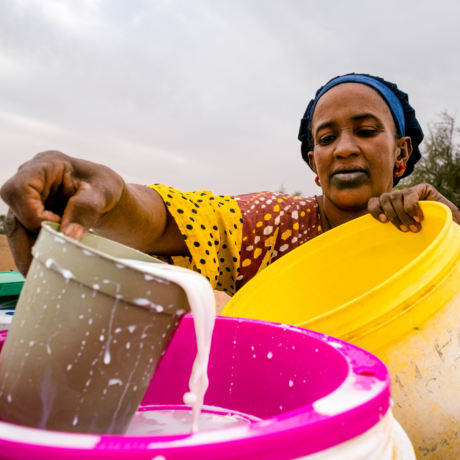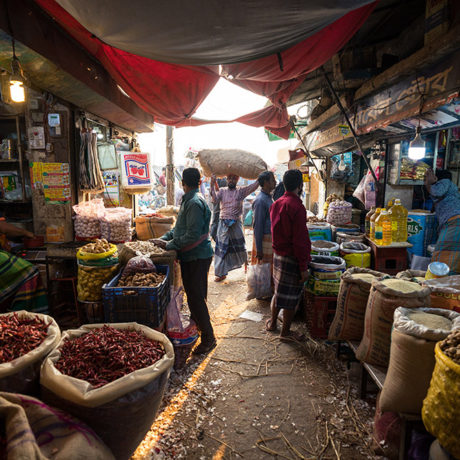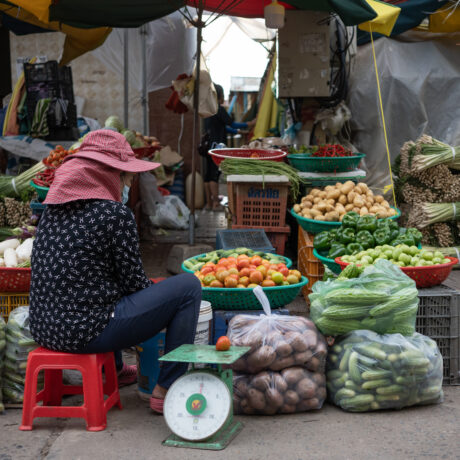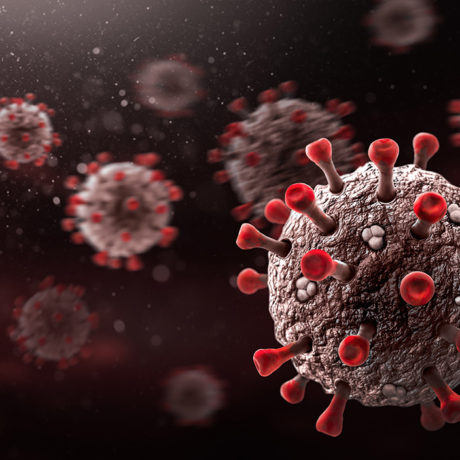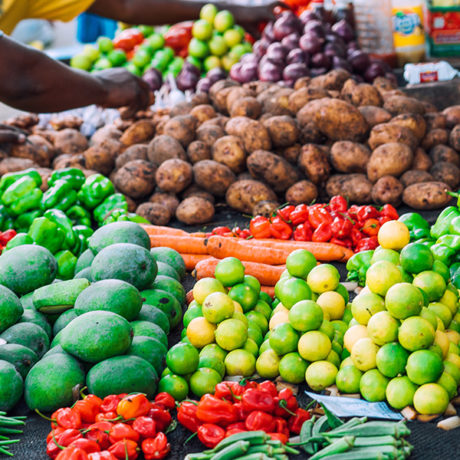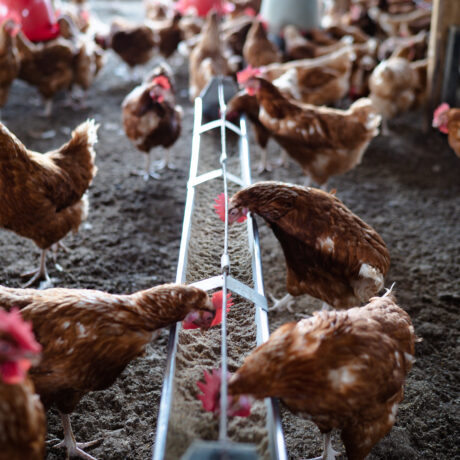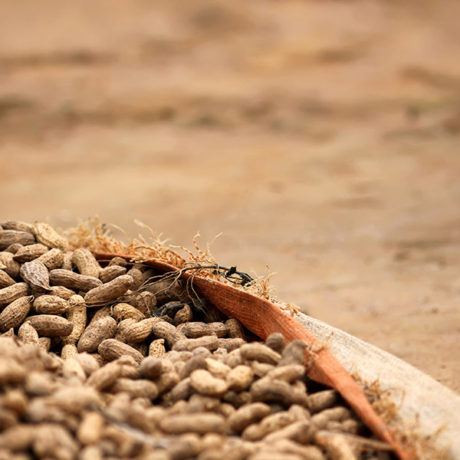Active Projects
Bangladesh: Fish and Poultry Food Safety Economics
Recent increases in the production of farmed fish in Bangladesh have been accompanied by a strengthening of the country’s food safety regulatory structure. This project, led by Madan Dey at Texas State University, used food safety economics and microbiology research to support data-driven food safety policies and practices in aquaculture. The team assessed food safety knowledge, attitudes, and practices among consumers and value chain actors; evaluated consumer demand for safer fish and the potential economic impact of food safety practices on production costs for small-scale fish farms; developed training materials to support the adoption of Good Aquacultural Practices; and engaged government stakeholders on the development of additional training resources and certification programs.
Co-PIs: Mohammad Saidur Rahman, Md. Akhtaruzzaman, Md. Abdul Alim, Samina Luthfa, K.H.M. Nazmul Hussain Nazir, and Pratheesh Sudhakaran
Cambodia: Food Safety Across the Vegetable Value Chain
Cambodia’s commitment to reducing malnutrition has led to the increased promotion of high-value, nutritionally rich foods, including raw vegetables which carry a risk of foodborne disease unless consistently protected from cross-contamination with foodborne pathogens. This project, co-led by Paul Ebner at Purdue University and Jessie Vipham at Kansas State University, integrated microbiology, social behavior change science, and economics to identify strategies to reduce foodborne illness from the consumption of vegetables. Researchers mapped and characterized the prominent pathogens and contamination points; assessed value chain actors’ food safety awareness and perceived barriers to adopting food safety interventions; and quantified consumers’ willingness to pay for safety-certified produce.
Co-PIs: Lyda Hok, Nora Bello, Rithy Chrun, Edward Dudley, Jasna Kovac, Chanthol Peng, and Navin Sreng
Kenya: Microbial Food Safety in the Poultry Value Chain
For Kenya’s rapidly growing population, chicken is of increasing importance in food security and nutrition. This project, co-led by Robert Onsare of the Kenya Medical Research Institute and Catherine Kunyanga of the University of Nairobi, was paused due to Executive Order 14169, “Reevaluating and Realigning United States Foreign Aid.” The project was collecting fundamental data on microbial food safety in the poultry value chain, including evaluating gender and youth roles related to food safety, assessing the prevalence of Salmonella and Campylobacter bacteria at the points of production and sale, characterizing the bacterial isolates using whole genome sequencing, and developing and implementing training in Best Management Practices for poultry production to improve food safety.
Nepal: Market-Led Produce Safety
Consumption of fresh produce contributes to well-nourished individuals, households, and communities, but when produce is consumed raw, prior contamination with foodborne pathogens can undermine its contributions to reaching nutritional targets. This project, led by Aditya Khanal of Tennessee State University, used food safety economics and microbiology to provide evidence and recommendations to strengthen food safety in Nepal’s produce value chain. Researchers assessed the risk of fresh produce contamination from household and on-farm water sources; quantified consumer demand for safer produce; conducted surveys to understand current food safety knowledge, attitudes, and practices; provided food safety training to extension agents and vegetable farmers; and convened government and private sector stakeholders to discuss future produce safety policies and investments.
Co-PIs: Ram Hari Timilsina, Rita Gurung, Agnes Kilonzo-Nthenge, Ashok K. Mishra, Saroj Poudel, and Sramika Rijal
Nigeria: Household Food Safety and Nutrition
Household-level food safety is a significant economic and public health concern in Nigeria, which has a childhood stunting rate of 33%. This project, led by Andrea Bersamin of the University of Alaska Fairbanks, identified strategic, feasible activities to mitigate and prevent household foodborne illnesses in Nigeria. Researchers assessed food safety risks from household surfaces; measured levels of childhood stunting; identified the challenges faced by mothers in providing safe and nutritious foods for their children; and convened stakeholders to discuss critical policy needs to support the implementation of Nigeria’s national food safety plan.
Co-PIs: Bolanle Otegbayo and Abiodun Atoloye
Collaborators: Folake Olukemi Samuel, Olufemi Oludare Aluko, Abiodun Ayooluwa Areola, and Nkem Torimiro
Senegal: Safer Milk Production and Processing
Senegal’s diverse and fragmented supply chain of small farms, aggregation sites, artisanal processing facilities, and transport from rural areas to urban centers creates challenges for protecting food safety in dairy products. This project, led by Manpreet Singh of the University of Georgia, advanced data-driven food safety practices among dairy producers and processors. Researchers collected baseline pathogen data from farms and small dairy processors; strengthened food safety laboratory research capacity; assessed current food safety knowledge, attitudes, and practices in the dairy value chain; and conducted food safety trainings for dairy producers and small-scale processors.
Co-PIs: Cheikh Ndiaye, Woubit Abebe, Victoria Collins McMaken, Younoussa Diallo, Rawah Faraj, Jessica Marter-Kenyon, and Harshavardhan Thippareddi
Completed Projects
Bangladesh: Food Safety Gap Assessment
Reducing the incidence of foodborne diseases and other food safety risks in Bangladesh is challenging because of the scientific and regulatory infrastructure required to support a food processing sector dominated by micro, small, and medium enterprises (MSMEs). An understanding of the prevailing gaps can support efforts to address food safety risks and create a robust food system.
This project, led by K. Vijayaraghavan of Sathguru Management Consultants, conducted baseline and gap assessments of food safety risks, regulations, scientific capability, and current food industry practices in Bangladesh. The first goal was to determine the critical factors for food safety and establish national primary interventions for addressing major gaps. In addition, an assessment of Bangladesh’s existing infrastructure for detecting foodborne pathogens identified key opportunities for workforce and institutional capacity building for monitoring and control of microbial food safety hazards.
This project laid the foundation for a data-driven and risk-based approach to reduce, manage, and mitigate foodborne illnesses across food sectors in Bangladesh. Opportunities to transform Bangladesh’s food safety environment include promoting public-private partnerships to meet the food testing needs of MSMEs, developing new rapid testing technologies, enabling mechanisms for data sharing across government agencies to track outbreaks, and supporting the government’s regulatory framework.
Cambodia: Food Safety at Produce Distribution Centers
Distribution centers are essential infrastructure in Cambodia’s food system, connecting vendors with produce to sell to consumers in the country’s ubiquitous open-air markets, but they are also possible sources for cross-contamination with pathogenic bacteria. Repeated exposure to these pathogens puts consumers, especially children, not only at risk of acute gastrointestinal infections, but also of enteropathy/environmental enteric dysfunction. Strategic food safety interventions along the value chain can reduce, manage, and mitigate these risks.
This project, led by Jessie Vipham of Kansas State University and Paul Ebner of Purdue University, assessed pathogen transmission on vegetables at distribution levels in Cambodia. Environmental sampling identified both the specific organisms of concern and the key points where contamination was present. This analysis was coupled with surveys to identify current practices and perceptions of food safety to inform the design and implementation of interventions to strengthen food safety in Cambodia.
This work enabled focused interventions in specific areas of the value chain where changes in food handling practices could lead to a reduction in the risk of contamination of vegetables that reach consumers. Data from this project can be used to identify targeted interventions that are effective and scalable. In addition, a landscape analysis of food safety programs and opportunities characterized the current food safety challenges in a Cambodian context and provide a baseline for future food safety efforts in the country.
COVID-19: Global Food Safety Task Force
The coronavirus pandemic forced the food industry into uncharted territory, driving it to confront a new set of challenges, including facility shutdowns and overall supply chain disruptions. Protecting the food industry workforce through policies to reduce person-to-person transmission and new technical, organizational, and personnel procedures to manage the risks associated with COVID-19 was essential for a secure and safe food supply.
This project, led by Martin Wiedmann of Cornell University, created and mentored an international task force to advise the food industry in Bangladesh, Cambodia, Kenya, Nepal, and Senegal. Task force members worked with the Cornell Institute for Food Safety to customize and translate COVID-19 resources for the food industry in their countries and delivered concise, science-based messaging on COVID-19. In addition, they provided guidance on mitigation strategies through Frequently Asked Question (FAQ) videos and food industry office hours.
The task force provided a rapid response to food system challenges and strengthened food security during the coronavirus pandemic. In the long term, the project’s network of experts and its scalable approach can be mobilized to address future pandemics or natural disasters which threaten the food systems in these countries.
The coronavirus pandemic forced the food industry into uncharted territory, driving it to confront a new set of challenges, including facility shutdowns and overall supply chain disruptions. Protecting the food industry workforce through policies to reduce person-to-person transmission and new technical, organizational, and personnel procedures to manage the risks associated with COVID-19 was essential for a secure and safe food supply.
This project, led by Martin Wiedmann of Cornell University, created and mentored an international task force to advise the food industry in Bangladesh, Cambodia, Kenya, Nepal, and Senegal. Task force members worked with the Cornell Institute for Food Safety to customize and translate COVID-19 resources for the food industry in their countries and delivered concise, science-based messaging on COVID-19. In addition, they provided guidance on mitigation strategies through Frequently Asked Question (FAQ) videos and food industry office hours.
The task force provided a rapid response to food system challenges and strengthened food security during the coronavirus pandemic. In the long term, the project’s network of experts and its scalable approach can be mobilized to address future pandemics or natural disasters which threaten the food systems in these countries.
The coronavirus pandemic forced the food industry into uncharted territory, driving it to confront a new set of challenges, including facility shutdowns and overall supply chain disruptions. Protecting the food industry workforce through policies to reduce person-to-person transmission and new technical, organizational, and personnel procedures to manage the risks associated with COVID-19 was essential for a secure and safe food supply.
This project, led by Martin Wiedmann of Cornell University, created and mentored an international task force to advise the food industry in Bangladesh, Cambodia, Kenya, Nepal, and Senegal. Task force members worked with the Cornell Institute for Food Safety to customize and translate COVID-19 resources for the food industry in their countries and delivered concise, science-based messaging on COVID-19. In addition, they provided guidance on mitigation strategies through Frequently Asked Question (FAQ) videos and food industry office hours.
The task force provided a rapid response to food system challenges and strengthened food security during the coronavirus pandemic. In the long term, the project’s network of experts and its scalable approach can be mobilized to address future pandemics or natural disasters which threaten the food systems in these countries.
The coronavirus pandemic forced the food industry into uncharted territory, driving it to confront a new set of challenges, including facility shutdowns and overall supply chain disruptions. Protecting the food industry workforce through policies to reduce person-to-person transmission and new technical, organizational, and personnel procedures to manage the risks associated with COVID-19 was essential for a secure and safe food supply.
This project, led by Martin Wiedmann of Cornell University, created and mentored an international task force to advise the food industry in Bangladesh, Cambodia, Kenya, Nepal, and Senegal. Task force members worked with the Cornell Institute for Food Safety to customize and translate COVID-19 resources for the food industry in their countries and delivered concise, science-based messaging on COVID-19. In addition, they provided guidance on mitigation strategies through Frequently Asked Question (FAQ) videos and food industry office hours.
The task force provided a rapid response to food system challenges and strengthened food security during the coronavirus pandemic. In the long term, the project’s network of experts and its scalable approach can be mobilized to address future pandemics or natural disasters which threaten the food systems in these countries.
The coronavirus pandemic forced the food industry into uncharted territory, driving it to confront a new set of challenges, including facility shutdowns and overall supply chain disruptions. Protecting the food industry workforce through policies to reduce person-to-person transmission and new technical, organizational, and personnel procedures to manage the risks associated with COVID-19 was essential for a secure and safe food supply.
This project, led by Martin Wiedmann of Cornell University, created and mentored an international task force to advise the food industry in Bangladesh, Cambodia, Kenya, Nepal, and Senegal. Task force members worked with the Cornell Institute for Food Safety to customize and translate COVID-19 resources for the food industry in their countries and delivered concise, science-based messaging on COVID-19. In addition, they provided guidance on mitigation strategies through Frequently Asked Question (FAQ) videos and food industry office hours.
The task force provided a rapid response to food system challenges and strengthened food security during the coronavirus pandemic. In the long term, the project’s network of experts and its scalable approach can be mobilized to address future pandemics or natural disasters which threaten the food systems in these countries.
East Africa: Food Safety Systems and Investments
Food safety practices and policies at national and regional levels have a strong impact on food security, trade opportunities, and human development. Each country is a unique environment in terms of food safety policy, food safety awareness, pathogens affecting value chains, and research capacity for managing food safety risks. Analyses of food safety systems and past investments on food safety is a foundation for countries to identify weaknesses, address gaps, select policies and practices that can be scaled up, and assess progress over time.
This project, led by Delia Grace Randolph and Florence Mutua of the International Livestock Research Institute, conducted a situational analysis and review of investments in food safety in five East Africa Community (EAC) member countries. This analysis documented existing policy and regulatory frameworks, available data on major foodborne diseases associated with livestock, fruits, and vegetables, and current stakeholder awareness of food safety in these food industry sectors.
Assessing previous and on-going food safety investments and evaluating their impact support efforts to identify critical success factors and make recommendations for data-driven food safety interventions. This project’s county-specific reports for Burundi, Kenya, Rwanda, Tanzania, and Uganda will form the basis for targeting food safety gaps, developing resilient food safety policy frameworks, increasing trade opportunities, and reducing the burden of foodborne diseases.
Food safety practices and policies at national and regional levels have a strong impact on food security, trade opportunities, and human development. Each country is a unique environment in terms of food safety policy, food safety awareness, pathogens affecting value chains, and research capacity for managing food safety risks. Analyses of food safety systems and past investments on food safety is a foundation for countries to identify weaknesses, address gaps, select policies and practices that can be scaled up, and assess progress over time.
This project, led by Delia Grace Randolph and Florence Mutua of the International Livestock Research Institute, conducted a situational analysis and review of investments in food safety in five East Africa Community (EAC) member countries. This analysis documented existing policy and regulatory frameworks, available data on major foodborne diseases associated with livestock, fruits, and vegetables, and current stakeholder awareness of food safety in these food industry sectors.
Assessing previous and on-going food safety investments and evaluating their impact support efforts to identify critical success factors and make recommendations for data-driven food safety interventions. This project’s county-specific reports for Burundi, Kenya, Rwanda, Tanzania, and Uganda will form the basis for targeting food safety gaps, developing resilient food safety policy frameworks, increasing trade opportunities, and reducing the burden of foodborne diseases.
Food safety practices and policies at national and regional levels have a strong impact on food security, trade opportunities, and human development. Each country is a unique environment in terms of food safety policy, food safety awareness, pathogens affecting value chains, and research capacity for managing food safety risks. Analyses of food safety systems and past investments on food safety is a foundation for countries to identify weaknesses, address gaps, select policies and practices that can be scaled up, and assess progress over time.
This project, led by Delia Grace Randolph and Florence Mutua of the International Livestock Research Institute, conducted a situational analysis and review of investments in food safety in five East Africa Community (EAC) member countries. This analysis documented existing policy and regulatory frameworks, available data on major foodborne diseases associated with livestock, fruits, and vegetables, and current stakeholder awareness of food safety in these food industry sectors.
Assessing previous and on-going food safety investments and evaluating their impact support efforts to identify critical success factors and make recommendations for data-driven food safety interventions. This project’s county-specific reports for Burundi, Kenya, Rwanda, Tanzania, and Uganda will form the basis for targeting food safety gaps, developing resilient food safety policy frameworks, increasing trade opportunities, and reducing the burden of foodborne diseases.
Food safety practices and policies at national and regional levels have a strong impact on food security, trade opportunities, and human development. Each country is a unique environment in terms of food safety policy, food safety awareness, pathogens affecting value chains, and research capacity for managing food safety risks. Analyses of food safety systems and past investments on food safety is a foundation for countries to identify weaknesses, address gaps, select policies and practices that can be scaled up, and assess progress over time.
This project, led by Delia Grace Randolph and Florence Mutua of the International Livestock Research Institute, conducted a situational analysis and review of investments in food safety in five East Africa Community (EAC) member countries. This analysis documented existing policy and regulatory frameworks, available data on major foodborne diseases associated with livestock, fruits, and vegetables, and current stakeholder awareness of food safety in these food industry sectors.
Assessing previous and on-going food safety investments and evaluating their impact support efforts to identify critical success factors and make recommendations for data-driven food safety interventions. This project’s county-specific reports for Burundi, Kenya, Rwanda, Tanzania, and Uganda will form the basis for targeting food safety gaps, developing resilient food safety policy frameworks, increasing trade opportunities, and reducing the burden of foodborne diseases.
Food safety practices and policies at national and regional levels have a strong impact on food security, trade opportunities, and human development. Each country is a unique environment in terms of food safety policy, food safety awareness, pathogens affecting value chains, and research capacity for managing food safety risks. Analyses of food safety systems and past investments on food safety is a foundation for countries to identify weaknesses, address gaps, select policies and practices that can be scaled up, and assess progress over time.
This project, led by Delia Grace Randolph and Florence Mutua of the International Livestock Research Institute, conducted a situational analysis and review of investments in food safety in five East Africa Community (EAC) member countries. This analysis documented existing policy and regulatory frameworks, available data on major foodborne diseases associated with livestock, fruits, and vegetables, and current stakeholder awareness of food safety in these food industry sectors.
Assessing previous and on-going food safety investments and evaluating their impact support efforts to identify critical success factors and make recommendations for data-driven food safety interventions. This project’s county-specific reports for Burundi, Kenya, Rwanda, Tanzania, and Uganda will form the basis for targeting food safety gaps, developing resilient food safety policy frameworks, increasing trade opportunities, and reducing the burden of foodborne diseases.
Kenya: Safer Poultry Production Practices
Poultry is an important dietary component for poor and middle-class Kenyan households and a key source of revenue for women and youth. In this project led by Barbara Kowalcyk at the Ohio State University, the team focused on systems-based, risk-informed approaches to food safety on small-scale poultry farms. Researchers collaborated with stakeholders using risk ranking to identify food safety priorities for the poultry value chain and conducted a review of gender roles in poultry production and the food safety hazards faced by men, women, and youth.
Co-PIs: Robert Onsare, Kathleen Colverson, Arie Havelaar, Sanja Ilic, Catherine Kunyanga, Kara Morgan, Robert Scharff, and Ahmed Yousef
Senegal: Reducing Groundnut Contamination
The Global Food Safety Partnership (GFSP) database shows that international donors spent $383 million to support 323 projects to improve food safety throughout Africa between 2010 and 2017. However, the scientific evidence on the burden of foodborne diseases in Senegal—including the risk of contamination in groundnuts—and the effectiveness of food safety mitigation strategies is limited.
This project, led by Jonathan Bauchet of Purdue University, conducted a landscape overview study to understand and catalog current food safety initiatives and investments taking place in Senegal, including food safety activities funded by USAID and other donors. In addition, a pilot study assessed the extent of microbial and fungal contamination in groundnuts produced and consumed by rural Senegalese households. At all stages of production, processing, and storage, groundnuts are vulnerable to microbial and fungal contamination that can lead to foodborne illness. The most acute health consequences come from carcinogenic aflatoxins, but the present risk level of fungal and microbial contamination is largely unknown, as is farmers’ awareness of and willingness to use technology to reduce contamination.
This project generated new insights on the state of food safety of groundnuts and an understanding of the points in production, storage, and processing where food safety interventions can reduce fungal and bacterial contamination. For Senegal’s food system, more information on the prevalence of foodborne diseases at the national and local levels will aid in establishing legal norms and on-the-ground monitoring and enforcement systems to reduce food contaminants.


